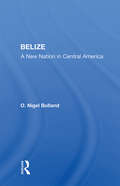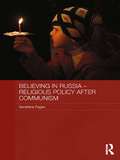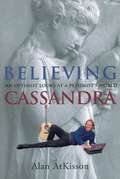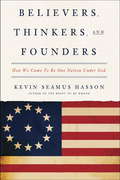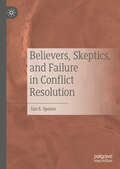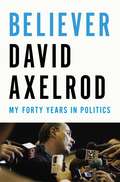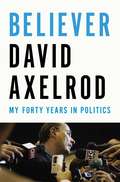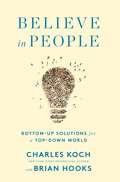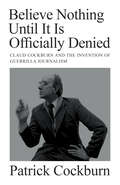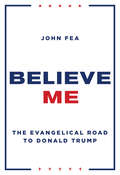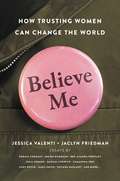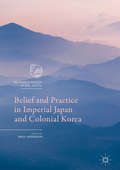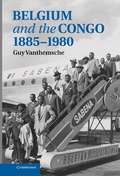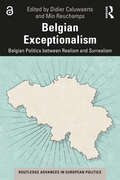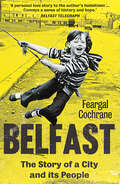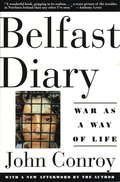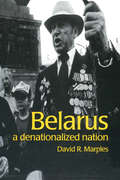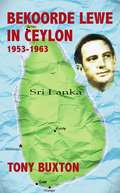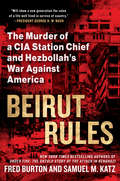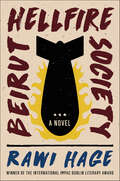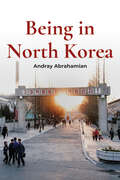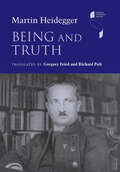- Table View
- List View
Belize: A New Nation In Central America
by O. Nigel BollandIndependent from Britain only since 1981, the new nation of Belize is situated at the intersection of two cultural spheres: the English-speaking Afro-Caribbean countries and the Spanish-speaking Central American republics. Its scanty population of about 150,000 is culturally heterogeneous, and its various ethnic groups coexist in a complex pattern
Believing in Russia - Religious Policy after Communism: Religious Policy After Communism (Routledge Contemporary Russia and Eastern Europe Series)
by Geraldine FaganThis book presents a comprehensive overview of religious policy in Russia since the end of the communist regime, exposing many of the ambiguities and uncertainties about the position of religion in Russian life. It reveals how religious freedom in Russia has, contrary to the widely held view, a long tradition, and how the leading religious institutions in Russia today, including especially the Russian Orthodox Church but also Muslim, Jewish and Buddhist establishments, owe a great deal of their special positions to the relationship they had with the former Soviet regime. It examines the resurgence of religious freedom in the years immediately after the end of the Soviet Union, showing how this was subsequently curtailed, but only partially, by the important law of 1997. It discusses the pursuit of privilege for the Russian Orthodox Church and other ‘traditional’ beliefs under presidents Putin and Medvedev, and assesses how far Russian Orthodox Christianity is related to Russian national culture, demonstrating the unresolved nature of the key question, ‘Is Russia to be an Orthodox country with religious minorities or a multi-confessional state?’ It concludes that Russian society’s continuing failure to reach a consensus on the role of religion in public life is destabilising the nation.
Believing Cassandra: An Optimist Looks at a Pessimist's World
by Alan AtkissonAtKisson sees concerned citizens and scientists who view the world hurtling toward self-destruction. Is it true that most of the human race could care less about their dire warnings?
Believers, Thinkers, and Founders: How We Came to Be One Nation Under God
by Kevin Seamus HassonIn Believers, Thinkers and Founders: How We Came to be One Nation Under God, Kevin Seamus Hasson--founder and president emeritus of the Becket Fund for Religious liberty--offers a refreshing resolution to the age-old dispute surrounding the relationship of religion and state: a return to first principles. "The traditional position," writes Hasson, "is that our fundamental human rights--including those secured by the First Amendment--are endowed to us by the Creator and that it would be perilous to permit the government ever to repudiate that point." America has steadfastly taken the position that there is a Supreme Being who is the source of our rights and the author of our equality. It has repeated that point for well over two hundred years throughout all branches and levels of government. Never mind, says the secularist challenge. God is, to put it mildly, religious. Religion has no place in Government. So God has no place in Government. It's just that simple. But for the government to say there is no creator who endows us with rights, Hasson argues, "is to do more than simply tinker with one of the most famous one-liners in history; it is to change the starting point of our whole explanation of who we are as Americans." He proposes a solution straight from the founding: the government acknowledges the existence of God who is the source of our rights philosophically but not religiously. This idea of the "Philosophers' God" is a conception of God based not on faith but on reason. Hasson suggests that by recognizing the distinction between the creator of the Declaration of Independence and the God of our faith traditions, we may be able to move past the culture wars over religion that have plagued the country. In Believers, Thinkers, and Founders, Hasson examines the idea of the "Philosophers' God" while looking at a host of issues--including the Pledge of Allegiance, prayer at public events, and prayer in public schools--as he demonstrates how we can still be one nation under God.
Believers, Skeptics, and Failure in Conflict Resolution
by Ian S. SpearsThis book discusses the following questions: Why are some conflicts so enduring and why is conflict resolution so hard? The author begins by introducing two conflicting perspectives, Skeptics and Believers, to highlight the lack of consensus on conflict resolution. The book further examines the literature on the sources of violent conflict, including ethnic, economic, environmental, and religious sources, and investigates the claim that an absence of knowledge, power, or political will are at the center of conflict resolution failures. By focusing on the problem of state formation, the author demonstrates the ways in which the nature of the state contributes to violent conflict. In the end, conflict resolution fails because individuals, groups, and external powers choose war and often prefer it over peaceful alternatives.
Believer: My Forty Years in Politics
by David AxelrodDavid Axelrod has always been a believer. Whether as a young journalist investigating city corruption, a campaign consultant guiding underdog candidates against entrenched orthodoxy, or as senior adviser to the president during one of the worst crises in American history, Axelrod held fast to his faith in the power of stories to unite diverse communities and ignite transformative political change. Now this legendary strategist, the mastermind behind Barack Obama’s historic election campaigns, shares a wealth of stories from his forty-year journey through the inner workings of American democracy. Believer is the tale of a political life well lived, of a man who never gave up on the deepest promises our country has to offer.<P><P> Believer reveals the roots of Axelrod’s devotion to politics and his faith in democratic change. As a child of the ’60s in New York City, Axelrod worked his first campaigns during a tumultuous decade that began with soaring optimism and ended in violence and chaos. As a young newspaperman in Chicago during the 1970s and ’80s, Axelrod witnessed another world transformed when he reported on the dissolution of the last of the big city political machines—Richard Daley, Dan Rostenkowski, and Harold Washington—along with the emergence of a dynamic black independent movement that ultimately made Obama’s ascent possible.<P> After cutting his teeth in the rollicking world of Chicago journalism, Axelrod switched careers to become a political strategist. His unorthodox tactics during his first campaign helped him get Paul Simon unexpectedly elected to the Senate, and soon Axelrod’s counsel was sought by the greatest lights of the Democratic Party. Working for path breakers like Hillary Clinton, Deval Patrick, and Rahm Emanuel—and morally conflicted characters like Rod Blagojevich and John Edwards—Axelrod, for better and worse, redefined the techniques by which modern political campaigns are run.<P> The heart of Believer is Axelrod’s twenty-year friendship with Barack Obama, a warm partnership that inspired both men even as it propelled each to great heights. Taking a chance on an unlikely candidate for the U.S. Senate, Axelrod ultimately collaborated closely with Obama on his political campaigns, and served as the invaluable strategist who contributed to the tremendous victories of 2008 and 2012. Switching careers again, Axelrod served as senior adviser to the president during one of the most challenging periods in national history: working at Obama’s side as he battled an economic disaster; navigated America through two wars; and fought to reform health care, the financial sector, and our gridlocked political institutions. In Believer, Axelrod offers a deeper and richer profile of this extraordinary figure—who in just four years vaulted from the Illinois State Senate to the Oval Office—from the perspective of one who was at his side every step of the way.<P> Spanning forty years that include corruption and transformation, turmoil and progress, Believer takes readers behind the closed doors of politics even as it offers a thrilling call to democratic action. Axelrod’s Believer is a powerful and inspiring memoir enlivened by the charm and candor of one of the greatest political strategists in recent American history.
Believer
by David AxelrodNew York Times Book Review"A stout defense--indeed, the best I have read--of the Obama years... David Axelrod has written a highly readable, uplifting account of the candidate he loves--and, reassuringly, has shown politics can still be a calling, not a business."David Axelrod has always been a believer. Whether as a young journalist investigating city corruption, a campaign consultant guiding underdog candidates against entrenched orthodoxy, or as senior adviser to the president during one of the worst crises in American history, Axelrod held fast to his faith in the power of stories to unite diverse communities and ignite transformative political change. Now this legendary strategist, the mastermind behind Barack Obama's historic election campaigns, shares a wealth of stories from his forty-year journey through the inner workings of American democracy. Believer is the tale of a political life well lived, of a man who never gave up on the deepest promises our country has to offer.Believer reveals the roots of Axelrod's devotion to politics and his faith in democratic change. As a child of the '60s in New York City, Axelrod worked his first campaigns during a tumultuous decade that began with soaring optimism and ended in violence and chaos. As a young newspaperman in Chicago during the 1970s and '80s, Axelrod witnessed another world transformed when he reported on the dissolution of the last of the big city political machines--Richard Daley, Dan Rostenkowski, and Harold Washington--along with the emergence of a dynamic black independent movement that ultimately made Obama's ascent possible.After cutting his teeth in the rollicking world of Chicago journalism, Axelrod switched careers to become a political strategist. His unorthodox tactics during his first campaign helped him get Paul Simon unexpectedly elected to the Senate, and soon Axelrod's counsel was sought by the greatest lights of the Democratic Party. Working for path breakers like Hillary Clinton, Deval Patrick, and Rahm Emanuel--and morally conflicted characters like Rod Blagojevich and John Edwards--Axelrod, for better and worse, redefined the techniques by which modern political campaigns are run.The heart of Believer is Axelrod's twenty-year friendship with Barack Obama, a warm partnership that inspired both men even as it propelled each to great heights. Taking a chance on an unlikely candidate for the U.S. Senate, Axelrod ultimately collaborated closely with Obama on his political campaigns, and served as the invaluable strategist who contributed to the tremendous victories of 2008 and 2012. Switching careers again, Axelrod served as senior adviser to the president during one of the most challenging periods in national history: working at Obama's side as he battled an economic disaster; navigated America through two wars; and fought to reform health care, the financial sector, and our gridlocked political institutions. In Believer, Axelrod offers a deeper and richer profile of this extraordinary figure--who in just four years vaulted from the Illinois State Senate to the Oval Office--from the perspective of one who was at his side every step of the way.Spanning forty years that include corruption and transformation, turmoil and progress, Believer takes readers behind the closed doors of politics even as it offers a thrilling call to democratic action. Axelrod's Believer is a powerful and inspiring memoir enlivened by the charm and candor of one of the greatest political strategists in recent American history.DORIS KEARNS GOODWIN, author of The Bully Pulpit and Team of Rivals"Beautifully written with warmth, humor, and remarkable self-awareness, Believer is one of the finest political memoirs I have ever read."From the Hardcover edition.
Believe in People: Bottom-Up Solutions for a Top-Down World
by Charles Koch Brian HooksA surprising take on how you can help tackle the really big problems in society–from one of America’s most successful entrepreneurs.People are looking for a better way. Towering barriers are holding millions of people back, and the institutions that should help everyone rise are not doing the job. Crumbling communities. One-size fits all education. Businesses that rig the economy. Public policy that stifles opportunity and emboldens the extremes. As a result, this country is quickly heading toward a two-tiered society.Today’s challenges call for nothing short of a paradigm shift – away from a top-down approach that sees people as problems to be managed, toward bottom-up solutions that empower everyone to realize their potential and foster a more inclusive society.Such a shift starts by asking: What would it mean to truly believe in people?Businessman and philanthropist Charles Koch has devoted his life to answering that question. Learn what he’s discovered during his 60-year career to help you apply the principles of empowerment in your life, in your business, and in society.By learning from the social movements and applying the principles that have enabled social progress throughout history, Koch has achieved more than he dreamed possible – building one of the world’s most successful companies and founding Stand Together, one of America’s most innovative philanthropic communities. Stand Together CEO Brian Hooks and Koch show how the only way to solve the really big problems – from poverty and addiction to harmful business practices and destructive public policy – is for each and every one of us to find and take action in our unique role as part of the solution.Full of compelling examples of what works – including several first-person accounts from individuals whose lives have been transformed – Koch and Hooks’ refreshing approach promotes partnership instead of partisanship and speaks to people from different perspectives and all walks of life. They show that no injustice is too tough to overcome if you share a deep belief in people, are willing to unite with anyone to do right, and work to empower others from the bottom up.
Believe Nothing Until it is Officially Denied: Claud Cockburn and the Invention of Guerrilla Journalism
by Patrick CockburnThe Extraordinary Life of a Revolutionary JournalistRadical journalist Claud Cockburn fought successfully against the political and media establishment, writing for publications as varied as The Times and Private Eye. To Graham Greene, he was the greatest journalist of the twentieth century.Born in China in 1904 and educated alongside Evelyn Waugh, Cockburn launched into a stellar career as a Times correspondent, first in Berlin, then New York, interviewing Al Capone in Chicago, and finally Washington. He resigned in 1932 to start The Week, an anti-Nazi and anti-establishment newsletter with an influence out of all proportion to its circulation. British officials were horrified by the scoops he published. These included stories on the political influence of German appeasers – the Cliveden Set – in the British elite and the previously suppressed news of Edward VIII&’s abdication.Cockburn wrote dispatches while fighting in the Spanish Civil War. In Spain, he helped W. H. Auden and clashed with George Orwell. Claud&’s private life, too, was eventful. He was married three times, once to Jean Ross, the model for Christopher Isherwood&’s Sally Bowles.Patrick Cockburn, himself an international journalist, chronicles his father Claud&’s lifelong dedication to a guerrilla campaign against the powerful on behalf of the powerless. It is a biography for today&’s age, in which journalism is frequently suppressed, overshadowed, undervalued, and corrupted
Believe Me: The Evangelical Road to Donald Trump
by John FeaA historian&’s discerning, critical take on current American politics&“Believe me&” may be the most commonly used phrase in Donald Trump&’s lexicon. Whether about building a wall or protecting a Christian heritage, the refrain has been constant. And to the surprise of many, a good 80 percent of white evangelicals have believed Trump—at least enough to help propel him into the White House. Historian John Fea is not surprised, however—and in these pages he explains how we have arrived at this unprecedented moment in American politics. An evangelical Christian himself, Fea argues that the embrace of Donald Trump is the logical outcome of a long-standing evangelical approach to public life defined by the politics of fear, the pursuit of worldly power, and a nostalgic longing for an American past. As insightful as it is timely, Fea&’s Believe Me challenges Christians to replace fear with hope, the pursuit of power with humility, and nostalgia with history.
Believe Me: The Evangelical Road to Donald Trump
by John FeaA historian&’s discerning, critical take on current American politics&“Believe me&” may be the most commonly used phrase in Donald Trump&’s lexicon. Whether about building a wall or protecting a Christian heritage, the refrain has been constant. And to the surprise of many, a good 80 percent of white evangelicals have believed Trump—at least enough to help propel him into the White House. Historian John Fea is not surprised, however—and in these pages he explains how we have arrived at this unprecedented moment in American politics. An evangelical Christian himself, Fea argues that the embrace of Donald Trump is the logical outcome of a long-standing evangelical approach to public life defined by the politics of fear, the pursuit of worldly power, and a nostalgic longing for an American past. As insightful as it is timely, Fea&’s Believe Me challenges Christians to replace fear with hope, the pursuit of power with humility, and nostalgia with history.
Believe Me: How Trusting Women Can Change the World
by Jessica Valenti Jaclyn Friedmanp.p1 {margin: 0.0px 0.0px 10.0px 0.0px; font: 12.0px 'Times New Roman'} p.p2 {margin: 0.0px 0.0px 0.0px 0.0px; font: 11.0px 'Times New Roman'} p.p3 {margin: 0.0px 0.0px 0.0px 0.0px; font: 11.0px 'Times New Roman'; min-height: 12.0px} p.p4 {margin: 0.0px 0.0px 0.0px 0.0px; font: 12.0px 'Times New Roman'; min-height: 15.0px} What would happen if we believed women? A groundbreaking anthology offers a potent rallying cry and theory of changeHarvey Weinstein. Brett Kavanaugh. Jeffrey Epstein. Donald Trump. The most infamous abusers in modern American history are being outed as women speak up to publicly expose behavior that was previously only whispered about -- and it's both making an impact, and sparking a backlash. From the leading, agenda-setting feminist editors of Yes Means Yes, Believe Me brings readers into the evolving landscape of the movement against sexual violence, and outlines how trusting women is the critical foundation for future progress. In Believe Me, contributors ask and answer the crucial question: What would happen if we didn't just believe women, but acted as though they matter? If we take women's experiences of online harassment seriously, it will transform the internet. If we listen to and center survivors, we could revolutionize our systems of justice. If we believe Black women when they talk about pain, we will save countless lives. With contributions from many of the most important voices in feminism today, Believe Me is an essential roadmap for the #MeToo era and beyond.
Belief and Practice in Imperial Japan and Colonial Korea (Religion and Society in Asia Pacific)
by Emily AndersonBringing together the work of leading scholars of religion in imperial Japan and colonial Korea, this collection addresses the complex ways in which religion served as a site of contestation and negotiation among different groups, including the Korean Choson court, the Japanese colonial government, representatives of different religions, and Korean and Japanese societies. It considers the complex religious landscape as well as the intersection of historical and political contexts that shaped the religious beliefs and practices of imperial and colonial subjects, offering a constructive contribution to contemporary conflicts that are rooted in a contested understanding of a complex and painful past and the unresolved history of Japan's colonial and imperial presence in Asia. Religion is a critical aspect of the current controversies and their historical contexts. Examining the complex and diverse ways that the state, and Japanese and colonial subjects negotiated religious policies, practices, and ministries in an attempt to delineate these "imperial relationships", this cutting edge text sheds considerable light on the precedents to current sources of tension.
Belgium: Selected Issues
by International Monetary FundA report from the International Monetary Fund.
Belgium and the Congo, 1885-1980
by Guy Vanthemsche Alice Cameron Stephen Windross Kate ConnellyWhile the impact of a colonising metropole on subjected territories has been widely scrutinized, the effect of empire on the colonising country has long been neglected. Recently, many studies have examined the repercussions of their respective empires on colonial powers such as the United Kingdom and France. Belgium and its African empire have been conspicuously absent from this discussion. This book attempts to fill this gap. Belgium and the Congo, 1885-1980 examines the effects of colonialism on the domestic politics, diplomacy and economics of Belgium, from 1880 - when King Leopold II began the country's expansionist enterprises in Africa - to the 1980s, well after the Congo's independence in June of 1960. By examining the colonial impact on its mother country Belgium, this study also contributes to a better understanding of Congo's past and present.
Belgian Exceptionalism: Belgian Politics between Realism and Surrealism (Routledge Advances in European Politics)
by Didier Caluwaerts Min ReuchampsThis book takes stock of Belgium’s exceptional and – for some foreign observers –schizophrenic position in the political world and explains its idiosyncrasy to a non-Belgian audience. Offering a broad and comprehensive analysis of Belgian politics, the guiding questions throughout each of the chapters of this book are: Is Belgium a political enigma, and why? Along which axes is Belgium "exceptional" compared to other countries? And what insights does a comparative study of Belgian politics have to offer? The book therefore provides a critical assessment of how Belgian politics "stands out" internationally, both in good and bad ways – including consociationalism, federalism, democratic innovations, Euroscepticism, government formation, gender equality, among others – and which factors can explain Belgium’s exceptional position. Based on cutting-edge research findings, the book will be of wide interest to scholars and students of Belgian politics, European Politics and Comparative politics.
Belfast: The Story of a City and its People
by Feargal Cochrane YA lively and inviting history of Belfast—exploring the highs and lows of a resilient city Modern Belfast is a beautiful city with a vibrant tradition of radicalism, industry, architectural innovation, and cultural achievement. But the city’s many qualities are all too frequently overlooked, its image marred by association with the political violence of the Troubles. Feargal Cochrane tells the story of his home city, revealing a rich and complex history which is not solely defined by these conflicts. From its emergence as a maritime port to its heyday as a center for the linen industry and crucible of liberal radicalism in the late eighteenth century, through to the famous shipyards where the Titanic was built, Belfast has long been a hub of innovation. Cochrane’s book offers a new perspective on this fascinating story, demonstrating how religion, culture, and politics have shaped the way people think, act, and vote in the city—and how Belfast’s past continues to shape its present and future.
Belfast Diary
by John ConroyResolution of intractable problems around the world requires understanding ordinary people as well as leaders. This street-level view of Northern Ireland provides the best explanation of the twenty-five-year conflict.
Belarus: A Denationalized Nation (Postcommunist States and Nations #Vol. 1)
by David MarplesIn any assessment and understanding of Belarus, the key questions to address include; why has Belarus apparently rejected independence under its first president Alyaksandr Lukashenka, and sought a union with Russia? Why has the government rejected democracy, infringed on the human rights of its citizens and fundamentally altered its constitution in favour of presidential authority? Has the country made any progress toward market reforms? How have Russia and the West responded to the actions of Belarus? And what is the future likely to hold for its ten million citizens? The author's conclusions are optimistic. Belarus, he believes, will survive into the twenty-first century, but as a Eurasian rather than a European state.
Bekoorde Lewe in Ceylon: 1953 - 1963
by Tony BuxtonDie skrywer se fassinerende avonture in die vroeë 50’s, beskryf ‘n avontuurlike lewenswyse waaroor die meeste van ons droom, maar wat vandag onmoontlik sal wees. Gebore in Colombo (Sri Lanka) in 1931. Hy het sy kinderlewe in Engeland deurgebring en het hy na die oorlog teruggekeer na Ceylon om in die familie besigheid te werk wat deur sy oupa begin is. Nie die gewone koloniale tipe waarvan daar verwag was om nie met die plaaslike mense te meng of om na hul klubs te gaan nie, het Tony die teenoorgestelde gedoen teen alle reëls in. Tony het die geselskap van die Ceylonese verkies . Dit het tot gevolg gehad dat hy baie vriende gemaak het insluitende bekende politikuste . Hy het ‘n passie vir onderwater verkenning gekweek in ‘n tyd toe die sport maar nog net begin het, voor daar SCUBA was. Hy het sy werk en loopbaan opgegee om op spiesvisvang, krewe, garnale en krappe te oorleef, akwarium visse te vang en in die woude te jag. Hy het homself as ‘n onderwater toergids gevestig wat bekende en ryk mense gelok het. Deur sy dienste verniet aan te bied het hulle hom terug betaal deur hom na hulle huise in Europa te nooi waar hy ‘n lewe beleef het wat hy nie eers geweet het bestaan nie. Gedurende hierdie reise trou hy met drie van sy vier vroue, twee Skandinawiese modelle en ‘n Italiaanse aktrise, aangetrokke tot sy lewenswyse, maar nie een van hulle kon in Ceylon aanpas nie. Die magtige Minister van Toerisme, ‘n duiker homself, stel Tony aan om onderwater toerisme te bevorder. Hulle word hegte vriende en hy raak betrokke in politike intriges. Selfs met geen geld lewe hy gelukkig deur vis te ruil vir basiese behoeftes. Op en af tussen luukse en gewone leefstyle was hy die eerste person om in die Maldives en suid Indië te duik, waar hy ‘n sensasie veroorsaak. Hierdie is ‘n aangrypende verhaal van nie so lank gelede in ‘n unieke Suid-Oostelike Asiatiese land – Ceylon, voor dit ingesluk was deur politieke onrus,
Beirut, I Love You
by Zena El KhalilZena el Khalil, a young Beirut-based female artist, writer, and activist who had an unconventional but worldly upbringing growing up in Lagos, Nigeria and attending art school in New York, returns after 9/11 to her familial home of Beirut and its mountains, beaches, food, music and drugs. Beirut, I Love You, spanning from 1994 to the present day, brings Beirut to life in all its glory and contradictions and is filled with personal anecdotes of Zena's life there: a place where, in spite of the pervasive desire for hope and the resilience of its people, still bears deep scars from the Lebanese Civil War and the Israeli invasion of 2006--a place where plastic surgery and AK 47s live side by side and nightclubs are situated on rooftops in order to avoid car bombs. Yet Zena and her friends, in particular her fellow rebel Maya, refuse to accept the extreme poles of Beirut, the militias and gender restrictions on one side, hedonism and materialism on the other. And although Zena experiences tragedy and loss, her story is a testament to the power of love and friendship, and the beauty of her city and its inhabitants. Written with an honest, profound simplicity, Zena is intoxicated by the country's contradictions--"Lebanon was, and always will be, schizophrenic"--and attempts to come to terms with her role among her friends, family, and city.
Beirut Rules: The Murder of a CIA Station Chief and Hezbollah's War Against America
by Fred Burton Samuel KatzFrom the New York Times bestselling coauthors of Under Fire--the riveting story of the kidnapping and murder of CIA Station Chief William Buckley.After a deadly terrorist bombing at the American embassy in Lebanon in 1983, only one man inside the CIA possessed the courage and skills to rebuild the networks destroyed in the blast: William Buckley. But the new Beirut station chief quickly became the target of a young terrorist named Imad Mughniyeh.Beirut Rules is the pulse-by-pulse account of Buckley's abduction, torture, and murder at the hands of Hezbollah terrorists. Drawing on never-before-seen government documents as well as interviews with Buckley's co-workers, friends and family, Burton and Katz reveal how the relentless search for Buckley in the wake of his kidnapping ignited a war against terror that continues to shape the Middle East to this day.
Beirut Hellfire Society: A Novel
by Rawi Hage“Truly a masterpiece.” —Lawrence JosephOn a ravaged street overlooking a cemetery in a Christian enclave in war-torn 1970s Beirut, we meet Pavlov, the son of a local undertaker. When his father dies suddenly, Pavlov is approached by a member of the mysterious Hellfire Society—an anti-religious sect that arranges secret burial for outcasts denied last rites because of their religion or sexuality. Pavlov agrees to take on his father’s work for the society, and over the course of the novel he becomes a survivor-chronicler of his embattled and faded community at the heart of Lebanon’s civil war.
Being in North Korea
by Andray AbrahamianIn 2009, while working on a PhD in Seoul, Andray Abrahamian visited North Korea, a country he had studied for years but never seen. He returned determined to find a way to work closely with North Koreans. Ten years and more than thirty visits later, Being in North Korea tells the story of his experiences setting up and running Choson Exchange, a non-profit that teaches North Koreans about entrepreneurship and economic policy. Abrahamian was provided a unique vantage into life in North Korea that belies stereotypes rampant in the media, instead revealing North Koreans as individuals ranging from true believers in the system to cynics wishing the Stalinist experiment would just end; from introverts to bubbly chatterboxes, optimists to pessimists. He sees a North Korea that is changing, invalidating some assumptions held in the West, but perhaps reinforcing others. Amid his stories of coping with the North Korean system, of the foreigners who frequent Pyongyang, and of everyday relationships, Abrahamian explores the challenges of teaching the inherently political subject of economics in a system where everyone must self-regulate their own minds; he looks at the role of women in the North Korean economy, and their exclusion from leadership; and he discusses how information is restricted, propaganda is distributed and internalized, and even how Pyongyang's nominally illicit property market functions. Along with these stories he interweaves the historical events that have led to today's North Korea. Drawing on the breadth of the author's in-country experience, Being in North Korea combines the intellectual rigor of a scholar with a writing style that will appeal to a general audience. Through the personal elements of a memoir that provide insights into North Korean society, readers will come away with a more realistic picture of the country and its people, and a better idea of what the future may hold for the nation.
Being and Truth (Studies in Continental Thought)
by Martin HeideggerA “well-crafted and careful rendering of an important and demanding volume” covering the philosopher’s views on language, life, and politics (Andrew Mitchell, Emory University).In these lectures, delivered in 1933-1934 while he was Rector of the University of Freiburg and an active supporter of the National Socialist regime, Martin Heidegger addresses the history of metaphysics and the notion of truth from Heraclitus to Hegel.First published in German in 2001, these two lecture courses offer a sustained encounter with Heidegger’s thinking during a period when he attempted to give expression to his highest ambitions for a philosophy engaged with politics and the world. While the lectures are strongly nationalistic, they also attack theories of racial supremacy in an attempt to stake out a distinctively Heideggerian understanding of what it means to be a people. This careful translation offers valuable insight into Heidegger’s views on language, truth, animality, and life, as well as his political thought and activity.
